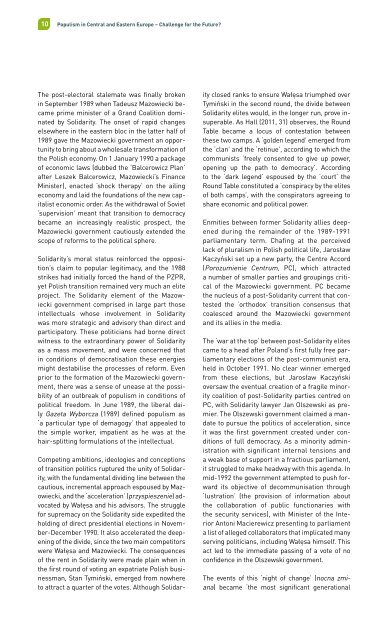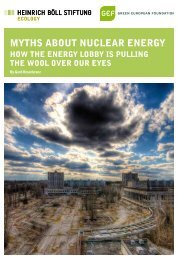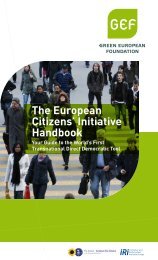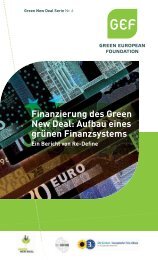Populism in Central and Eastern Europe â Challenge for the Future?
Populism in Central and Eastern Europe â Challenge for the Future?
Populism in Central and Eastern Europe â Challenge for the Future?
- No tags were found...
You also want an ePaper? Increase the reach of your titles
YUMPU automatically turns print PDFs into web optimized ePapers that Google loves.
10 <strong>Populism</strong> <strong>in</strong> <strong>Central</strong> <strong>and</strong> <strong>Eastern</strong> <strong>Europe</strong> – <strong>Challenge</strong> <strong>for</strong> <strong>the</strong> <strong>Future</strong><br />
The post-electoral stalemate was f<strong>in</strong>ally broken<br />
<strong>in</strong> September 1989 when Tadeusz Mazowiecki became<br />
prime m<strong>in</strong>ister of a Gr<strong>and</strong> Coalition dom<strong>in</strong>ated<br />
by Solidarity. The onset of rapid changes<br />
elsewhere <strong>in</strong> <strong>the</strong> eastern bloc <strong>in</strong> <strong>the</strong> latter half of<br />
1989 gave <strong>the</strong> Mazowiecki government an opportunity<br />
to br<strong>in</strong>g about a wholesale trans<strong>for</strong>mation of<br />
<strong>the</strong> Polish economy. On 1 January 1990 a package<br />
of economic laws (dubbed <strong>the</strong> ‘Balcerowicz Plan’<br />
after Leszek Balcerowicz, Mazowiecki’s F<strong>in</strong>ance<br />
M<strong>in</strong>ister), enacted ‘shock <strong>the</strong>rapy’ on <strong>the</strong> ail<strong>in</strong>g<br />
economy <strong>and</strong> laid <strong>the</strong> foundations of <strong>the</strong> new capitalist<br />
economic order. As <strong>the</strong> withdrawal of Soviet<br />
‘supervision’ meant that transition to democracy<br />
became an <strong>in</strong>creas<strong>in</strong>gly realistic prospect, <strong>the</strong><br />
Mazowiecki government cautiously extended <strong>the</strong><br />
scope of re<strong>for</strong>ms to <strong>the</strong> political sphere.<br />
Solidarity’s moral status re<strong>in</strong><strong>for</strong>ced <strong>the</strong> opposition’s<br />
claim to popular legitimacy, <strong>and</strong> <strong>the</strong> 1988<br />
strikes had <strong>in</strong>itially <strong>for</strong>ced <strong>the</strong> h<strong>and</strong> of <strong>the</strong> PZPR,<br />
yet Polish transition rema<strong>in</strong>ed very much an elite<br />
project. The Solidarity element of <strong>the</strong> Mazowiecki<br />
government comprised <strong>in</strong> large part those<br />
<strong>in</strong>tellectuals whose <strong>in</strong>volvement <strong>in</strong> Solidarity<br />
was more strategic <strong>and</strong> advisory than direct <strong>and</strong><br />
participatory. These politicians had borne direct<br />
witness to <strong>the</strong> extraord<strong>in</strong>ary power of Solidarity<br />
as a mass movement, <strong>and</strong> were concerned that<br />
<strong>in</strong> conditions of democratisation <strong>the</strong>se energies<br />
might destabilise <strong>the</strong> processes of re<strong>for</strong>m. Even<br />
prior to <strong>the</strong> <strong>for</strong>mation of <strong>the</strong> Mazowiecki government,<br />
<strong>the</strong>re was a sense of unease at <strong>the</strong> possibility<br />
of an outbreak of populism <strong>in</strong> conditions of<br />
political freedom. In June 1989, <strong>the</strong> liberal daily<br />
Gazeta Wyborcza (1989) def<strong>in</strong>ed populism as<br />
‘a particular type of demagogy’ that appealed to<br />
<strong>the</strong> simple worker, impatient as he was at <strong>the</strong><br />
hair-splitt<strong>in</strong>g <strong>for</strong>mulations of <strong>the</strong> <strong>in</strong>tellectual.<br />
Compet<strong>in</strong>g ambitions, ideologies <strong>and</strong> conceptions<br />
of transition politics ruptured <strong>the</strong> unity of Solidarity,<br />
with <strong>the</strong> fundamental divid<strong>in</strong>g l<strong>in</strong>e between <strong>the</strong><br />
cautious, <strong>in</strong>cremental approach espoused by Mazowiecki,<br />
<strong>and</strong> <strong>the</strong> ‘acceleration’ (przyspieszenie) advocated<br />
by Wałęsa <strong>and</strong> his advisors. The struggle<br />
<strong>for</strong> supremacy on <strong>the</strong> Solidarity side expedited <strong>the</strong><br />
hold<strong>in</strong>g of direct presidential elections <strong>in</strong> November-December<br />
1990. It also accelerated <strong>the</strong> deepen<strong>in</strong>g<br />
of <strong>the</strong> divide, s<strong>in</strong>ce <strong>the</strong> two ma<strong>in</strong> competitors<br />
were Wałęsa <strong>and</strong> Mazowiecki. The consequences<br />
of <strong>the</strong> rent <strong>in</strong> Solidarity were made pla<strong>in</strong> when <strong>in</strong><br />
<strong>the</strong> first round of vot<strong>in</strong>g an expatriate Polish bus<strong>in</strong>essman,<br />
Stan Tymiński, emerged from nowhere<br />
to attract a quarter of <strong>the</strong> votes. Although Solidarity<br />
closed ranks to ensure Wałęsa triumphed over<br />
Tymiński <strong>in</strong> <strong>the</strong> second round, <strong>the</strong> divide between<br />
Solidarity elites would, <strong>in</strong> <strong>the</strong> longer run, prove <strong>in</strong>superable.<br />
As Hall (2011, 31) observes, <strong>the</strong> Round<br />
Table became a locus of contestation between<br />
<strong>the</strong>se two camps. A ‘golden legend’ emerged from<br />
<strong>the</strong> ‘clan’ <strong>and</strong> <strong>the</strong> ‘ret<strong>in</strong>ue’, accord<strong>in</strong>g to which <strong>the</strong><br />
communists ‘freely consented to give up power,<br />
open<strong>in</strong>g up <strong>the</strong> path to democracy’. Accord<strong>in</strong>g<br />
to <strong>the</strong> ‘dark legend’ espoused by <strong>the</strong> ‘court’ <strong>the</strong><br />
Round Table constituted a ‘conspiracy by <strong>the</strong> elites<br />
of both camps’, with <strong>the</strong> conspirators agree<strong>in</strong>g to<br />
share economic <strong>and</strong> political power.<br />
Enmities between <strong>for</strong>mer Solidarity allies deepened<br />
dur<strong>in</strong>g <strong>the</strong> rema<strong>in</strong>der of <strong>the</strong> 1989-1991<br />
parliamentary term. Chaf<strong>in</strong>g at <strong>the</strong> perceived<br />
lack of pluralism <strong>in</strong> Polish political life, Jarosław<br />
Kaczyński set up a new party, <strong>the</strong> Centre Accord<br />
(Porozumienie Centrum, PC), which attracted<br />
a number of smaller parties <strong>and</strong> group<strong>in</strong>gs critical<br />
of <strong>the</strong> Mazowiecki government. PC became<br />
<strong>the</strong> nucleus of a post-Solidarity current that contested<br />
<strong>the</strong> ‘orthodox’ transition consensus that<br />
coalesced around <strong>the</strong> Mazowiecki government<br />
<strong>and</strong> its allies <strong>in</strong> <strong>the</strong> media.<br />
The ‘war at <strong>the</strong> top’ between post-Solidarity elites<br />
came to a head after Pol<strong>and</strong>’s first fully free parliamentary<br />
elections of <strong>the</strong> post-communist era,<br />
held <strong>in</strong> October 1991. No clear w<strong>in</strong>ner emerged<br />
from <strong>the</strong>se elections, but Jarosław Kaczyński<br />
oversaw <strong>the</strong> eventual creation of a fragile m<strong>in</strong>ority<br />
coalition of post-Solidarity parties centred on<br />
PC, with Solidarity lawyer Jan Olszewski as premier.<br />
The Olszewski government claimed a m<strong>and</strong>ate<br />
to pursue <strong>the</strong> politics of acceleration, s<strong>in</strong>ce<br />
it was <strong>the</strong> first government created under conditions<br />
of full democracy. As a m<strong>in</strong>ority adm<strong>in</strong>istration<br />
with significant <strong>in</strong>ternal tensions <strong>and</strong><br />
a weak base of support <strong>in</strong> a fractious parliament,<br />
it struggled to make headway with this agenda. In<br />
mid-1992 <strong>the</strong> government attempted to push <strong>for</strong>ward<br />
its objective of decommunisation through<br />
‘lustration’ (<strong>the</strong> provision of <strong>in</strong><strong>for</strong>mation about<br />
<strong>the</strong> collaboration of public functionaries with<br />
<strong>the</strong> security services), with M<strong>in</strong>ister of <strong>the</strong> Interior<br />
Antoni Macierewicz present<strong>in</strong>g to parliament<br />
a list of alleged collaborators that implicated many<br />
serv<strong>in</strong>g politicians, <strong>in</strong>clud<strong>in</strong>g Wałęsa himself. This<br />
act led to <strong>the</strong> immediate pass<strong>in</strong>g of a vote of no<br />
confidence <strong>in</strong> <strong>the</strong> Olszewski government.<br />
The events of this ‘night of change’ (nocna zmiana)<br />
became ‘<strong>the</strong> most significant generational










